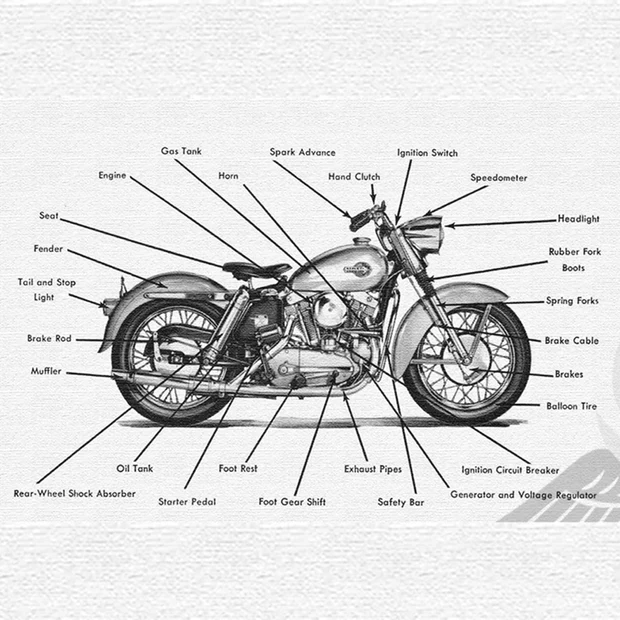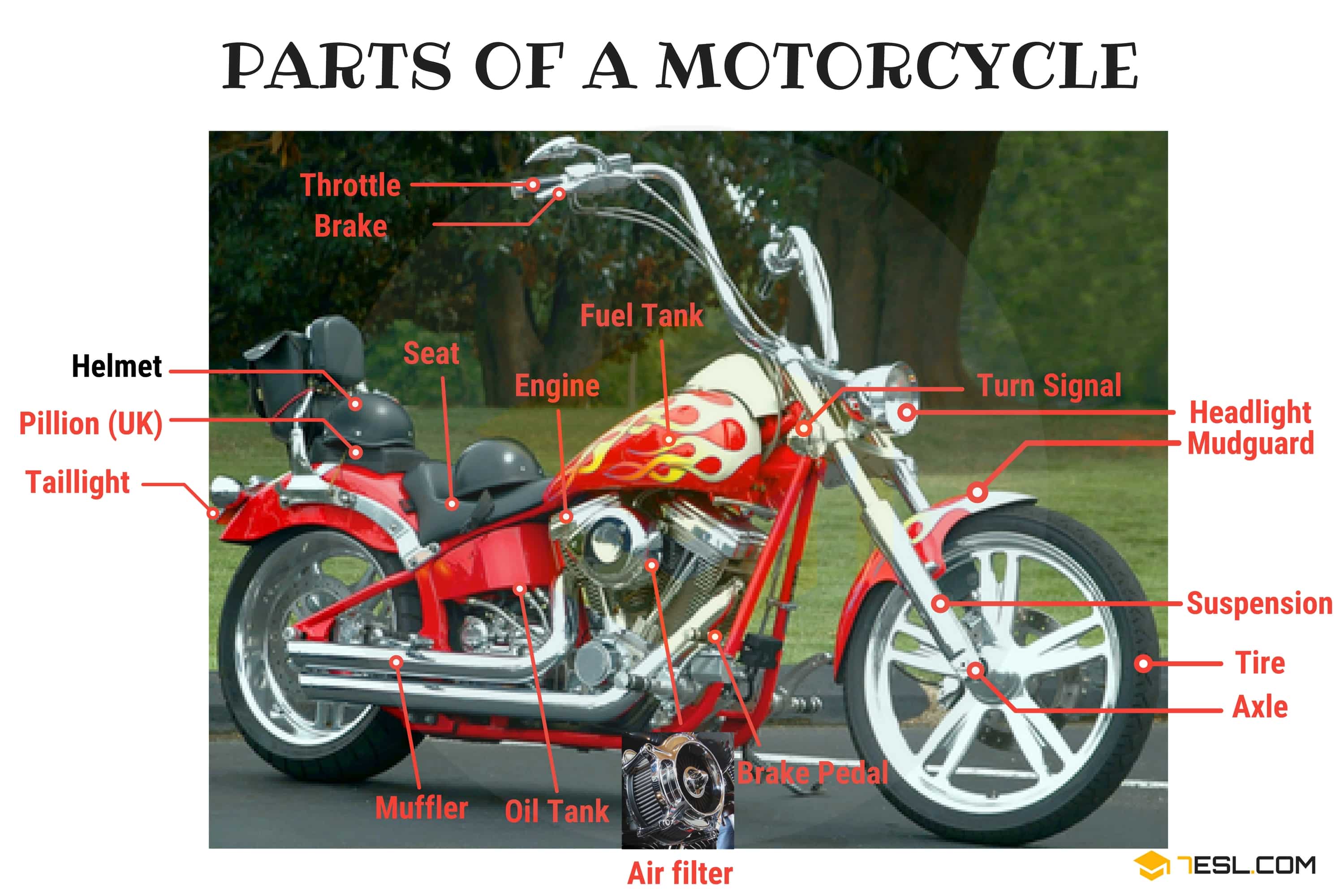A Deep Dive Into Performance Tuning with Bike Parts Wellington
A Deep Dive Into Performance Tuning with Bike Parts Wellington
Blog Article
Discover the Vital MotorBike Parts You Need for Optimum Efficiency
Recognizing the crucial parts of a bike is basic for accomplishing peak efficiency. Each part, from the engine to the stopping system, plays an essential role in general functionality and safety and security. Routine upkeep can stop unexpected failures and improve the riding experience. Lots of bikers forget the intricacies of these systems. Finding how they collaborate can result in a much more effective experience. What important components should every motorcyclist focus on?
The Engine: The Heart of Your Bike
The engine acts as the core element of a motorbike, driving its efficiency and defining its capabilities. It is accountable for converting fuel into mechanical power, which powers the bike ahead. Numerous kinds of engines are employed, consisting of single-cylinder, V-twin, and inline setups, each offering distinct features matched for various riding designs and objectives. The engine dimension, typically gauged in cubic centimeters (cc), considerably affects performance, with larger engines normally providing more power and torque.Furthermore, the engine's design and innovation, such as gas shot systems or air-cooling versus liquid-cooling, affect performance and integrity. Upkeep is important for peak operation; variables like normal oil changes and checking trigger plugs warranty long life. Cyclists often consider an engine's responsiveness and level of smoothness, as these characteristics boost the general riding experience. Ultimately, the engine stays a vital element that defines not just the bike's efficiency but additionally the rider's link to the machine.
The Transmission: Changing Gears Smoothly
The transmission plays a vital role in a motorbike's performance, particularly in the auto mechanics of equipment moving. Comprehending how to move gears efficiently can enhance the general riding experience, while routine maintenance assurances peak capability. Correct focus to these aspects can greatly impact the durability and performance of the bike.

Equipment Shifting Mechanics
Smooth gear moving is crucial for ideal motorcycle efficiency, considerably impacting both acceleration and control. The auto mechanics of gear changing entail the interaction in between the clutch, equipment bar, and transmission system. When a biker engages the clutch, it disengages the engine from the transmission, permitting for a gear modification without harming the parts. A well-timed launch of the clutch, integrated with precise activity of the gear bar, assists in a seamless change in between gears. This procedure guarantees that the engine runs within its finest power band, enhancing efficiency. Motorcycle Spares Christchurch. Additionally, comprehending the gear ratios and their result on rate and torque can assist riders make notified choices during shifts, inevitably adding to a more receptive and pleasurable riding experience
Upkeep Tips Value
Routine upkeep plays an important function in ensuring that the transmission system runs effectively, enabling for smooth gear changes. Routinely changing the transmission and examining fluid is vital, as old fluid can result in raised rubbing and wear. Furthermore, examining the clutch for wear warranties peak engagement and disengagement, protecting against slippage during gear modifications. Lubrication of relocating components is equally crucial to lower rubbing and boost efficiency. Motorbike proprietors need to also keep an eye on for leakages and uncommon sounds, as these can show underlying concerns. By adhering to these maintenance ideas, bikers can extend the life-span of their transmission system, assuring that gear shifts remain seamless and contributing to the general efficiency of their motorbike.
The Braking System: Ensuring Security on Every Trip
Braking systems are basic parts that directly affect a motorbike's security and efficiency. They include different parts, including brake pads, blades, calipers, and hydraulic lines, all interacting to guarantee effective deceleration. The sort of stopping system-- typically either disc or drum-- affects responsiveness and stopping power.Regular upkeep is important to copyright peak performance; used brake pads can cause reduced efficiency and enhanced stopping distances. Additionally, the top quality of brake fluid should be checked, as it can soak up moisture gradually, jeopardizing braking efficiency.Riders need to also consider the importance of anti-lock stopping systems (ABDOMINAL MUSCLE), which avoid wheel lockup during sudden quits, improving general safety. Effectively functioning brakes are not simply concerning stopping; they infuse self-confidence in the motorcyclist, allowing for more secure navigation with various surfaces. Inevitably, a reputable braking system is crucial for appreciating every adventure with assurance.
The Suspension: Enhancing Convenience and Control
A well-functioning suspension system greatly adds to a motorcycle's overall efficiency, matching the efficiency of the braking system. The suspension plays a considerable function in absorbing shocks from unequal surface areas, guaranteeing a smoother adventure while preserving tire contact with the roadway. This contact is essential for both security and control, enabling riders to navigate edges with confidence and precision.Different types of suspension systems, such as telescopic forks or mono-shocks, use differing levels of convenience and handling. Properly tuned suspension improves responsiveness, providing the biker with a more connected feel to the motorcycle. Normal maintenance checks are essential to establish the suspension components, including springtimes and dampers, are working at their ideal. An efficient suspension system not only boosts the riding experience yet also adds to the longevity of various other motorcycle components by lessening damage. Because of this, spending in top quality suspension is crucial for any kind of serious motorcycle fanatic.
The Tires: Attaching You to the Roadway
Tires play a vital duty in a motorcycle's efficiency, acting as the main link between the roadway and the rider. Understanding the different types of tires offered can significantly impact dealing with and safety. Furthermore, routine maintenance is important to assure peak tire performance and longevity.
Tire Types Explained
Just how do various tire kinds influence a motorbike's performance? Tire kinds play an essential role in determining a motorcycle's security, handling, and grip. Sport tires, made for high efficiency, offer enhanced grip and responsiveness on paved roads, making them suitable for racing and hostile riding. Conversely, exploring tires focus on sturdiness and comfort, providing a smoother ride for long-distance travel. Off-road tires, identified click reference by their rugged walk patterns, master traction on unpaved surface areas, appropriate for journey lovers. Additionally, dual-sport tires blend attributes from both on-road and off-road groups, satisfying versatile riding demands. Ultimately, picking the best tire type is essential for maximizing performance, guaranteeing security, and enhancing the total riding experience.
Upkeep Tips Offered
While riding when traveling, preserving suitable tire condition is vital for safety and efficiency. Routinely examining tire stress is very important, as under-inflated tires can cause inadequate handling and boosted wear. It is advisable to examine step deepness regularly; worn tires compromise grasp and security. Furthermore, cyclists must try to find indications of damages, such as splits or bulges, which can indicate the requirement for substitute. Rotating tires occasionally ensures even wear, boosting longevity. Maintaining tires tidy from debris and staying clear of too much visuals can extend their life-span. Preserving correct placement and equilibrium adds to come to a head performance, decreasing stress on various other bike components. Following these upkeep tips will considerably improve the general riding experience.
The Fuel System: Fueling Efficiency and Effectiveness
The gas system plays a vital duty in making the most of a motorcycle's performance and efficiency, as it ensures the ideal shipment of fuel to the engine. It consists of numerous important elements, including the gas tank, gas pump, fuel filter, and gas injectors or carburetor. Each part should operate properly to assure a effective and smooth ride.The fuel container stores fuel and provides it to the engine using the gas pump, which produces the essential stress. A gas filter stops pollutants from entering the engine, while the injectors or carburetor mix fuel with air for combustion.Proper maintenance of the gas system is vital; a stopped up filter or malfunctioning injector can lead to reduced performance and boosted gas intake. By verifying that the fuel system operates successfully, motorcyclists can take pleasure in improved throttle feedback, much better fuel economic situation, and generally enhanced riding experience.
The Electric System: Powering Your Trip
A reliable electrical system is essential for the general functionality and safety and security of a motorcycle, as it powers vital elements such as the ignition, lights, and various digital systems. This system includes the battery, which stores power, and the generator, in charge of producing power while the engine runs. The electrical wiring harness attaches these components, making certain dependable power distribution.Additionally, integrates shield the system from overloads, while relays help manage high-current tools with low-power signals. A well-kept electric system boosts performance by ensuring smooth beginnings and constant operation of signals and lights, important for cyclist visibility and safety.Regular checks of the battery's charge and connections are essential for avoiding electric failings. Motorcyclists ought to likewise evaluate circuitry for wear and tear, guaranteeing all elements operate preferably. Ultimately, Your Domain Name a robust electrical system contributes substantially to the overall performance and reliability of the motorbike.
Often Asked Inquiries
Just how Typically Should I Change My Bike's Battery?
The frequency of motorbike battery substitute depends upon use and maintenance (Motorbike Components NZ). Typically, batteries ought to be changed every three to five years. Regular checks can help determine when a replacement is required for peak performance
What Tools Do I Need for Basic Motorcycle Maintenance?
For fundamental motorcycle upkeep, one calls for necessary tools such as a socket collection, wrenches, screwdrivers, pliers, tire pressure scale, and a torque wrench. These devices promote efficient maintenance and ensure the motorbike runs effectively and securely.
Just How Can I Enhance My Bike's The rules of aerodynamics?
To boost motorcycle aerodynamics, one need to take into consideration adjusting fairings, utilizing windscreen expansions, enhancing body position, and decreasing overall weight. These modifications assist reduce drag, boosting security and fuel performance throughout experiences.
What Are the Signs of a Failing Electric System?
Indications of a failing electric system include lowering lights, trouble starting, uneven tool readings, and blown fuses. Motorcycle Parts Auckland. Uncommon scents or corrosion around battery terminals might also show underlying problems needing prompt focus for security and performance

Just how Do I Select the Right Oil for My Motorcycle?
When picking oil for a bike, one must take into consideration the producer's specifications, thickness scores, and the kind of riding. Furthermore, conventional versus artificial oil can impact efficiency and engine protection, affecting the decision greatly. The engine dimension, normally determined in cubic centimeters (cc), significantly affects performance, with larger engines normally supplying more power and torque.Furthermore, the engine's layout and modern technology, such as gas injection systems or air-cooling versus liquid-cooling, influence efficiency and dependability. A well-functioning suspension system considerably contributes to a motorcycle's general efficiency, complementing the efficiency of the stopping system. The fuel system plays a vital duty in maximizing a motorcycle's performance and effectiveness, as it guarantees the ideal distribution of gas to the engine. A gas filter stops contaminants from going into the engine, while the injectors or carburetor mix gas with air for combustion.Proper upkeep of the fuel system is important; a clogged up filter or malfunctioning injector can lead to reduced efficiency and increased fuel intake. A well-kept electrical system improves efficiency find more by ensuring smooth begins and constant operation of lights and signals, important for biker exposure and safety.Regular checks of the battery's cost and links are vital for preventing electrical failings.
Report this page